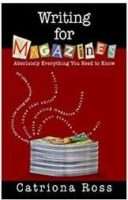If you enjoy writing, why not earn some extra cash – and possibly launch yourself into a new career as a journalist – by writing magazine articles? If you are at school or college, or have a nine-to-five job, freelance writing on the side for magazines is a relatively easy, low-risk, fun option. Here’s why you should try it:
Firstly, you don’t need any specific training to become a writer. No competency tests, entrance exams or professional qualifications are required to get your name (or byline, as it’s called) into a magazine. If you don’t have two years’ experience in a newsroom, or a first-class degree in English, or even a school-leaving certificate, nobody minds. All you need is the ability to sniff out good story ideas, pitch them to the right publications in an appropriate way, and write professionally. And these are skills you can learn right now.
Secondly, there’s plenty of work available, as magazines are big business, even in the darkest times. Online magazine store www.themagazineboy.com lists over 1,300 US titles; www.onlinenewsagent.co.uk lists a whopping 3,000 UK titles. Some magazines rely completely on freelancers to fill their features pages, while others use freelancers for just a couple of stories per issue. In my experience, the average mainstream magazine buys up to 10 articles from freelance writers every issue. This is excellent news for you, the writer: magazines need you.
You can write from anywhere. Equipped with merely a phone and a computer with Internet connection and email facility, you can research, write and submit your features from virtually anywhere on the planet. Dreaming of writing articles from your home office, a yacht in the Pacific, a log cabin in the mountains, or a hotel room overlooking the town square during the annual Palio horse race in Siena, Tuscany? Go ahead. It’s as easy as clicking on ‘send’.
It’s stimulating and creative. You, the writer, hone your intellectual skills and creative talents daily. You get to play with words, organise your thoughts, sharpen the way you express yourself, present winning arguments, brainstorm titles and blurbs, find innovative ways into a feature, and select the pieces of story that’ll hit a reader’s spot. Writing articles is tangibly satisfying work: you’re able to pat yourself on the back when you’ve created an entire feature from scratch and seen it in glossy colour on the magazine racks.
Finally, you add value to the world. From the platform of a magazine feature, you get to change the world a little. This flexible, accessible vehicle enables you to inform, educate, help, heal, comfort and entertain people – sometimes by the million. People tell their stories through you, and sometimes you give an important voice to those who couldn’t otherwise express themselves. Just think: a feature you’ve written on post-natal depression may show a reader she’s not alone. An article on ways to help the planet may inspire a neighbourhood to initiate a recycling programme. A single magazine article can indeed be life-changing, as the zillions of letters and emails editors receive daily prove. For the writer, knowing you’ve written something worthwhile is a warm, wonderful feeling.
Naturally, there’s a bit of competition for the world’s best career, and freelance writing does have its challenges (it wouldn’t be life if it didn’t). This is where I come in. Step by step, I’ll show you how to master the challenges, get the edge on other magazine journalists, and create a lifestyle that has you running out of the gates in the morning.
***
Why editors love freelancers
They may not admit it, but they do! After all, magazines benefit hugely from using freelancers. How?
A freelancer costs much less than a staff writer. The company doesn’t need to subsidise your overheads, holidays, mental health days, medical aid and pension contributions, tea and coffee supplies…
You’re an invaluable source of new story ideas. While editors and staff writers are stuck in the office five days a week, you waft around the vibrant outside world, having interesting daily encounters and picking up story ideas by the truckload. You know how it goes – you’re chatting to the supermarket cashier and she tells you a great story about her neighbour, who did a course for animal psychics and now communicates with her cat…
If you have knowledge in a certain field – finance, medical, animal behaviour, music, environmental issues – editors of specialist magazines want and need your expertise.
Sometimes magazine people get to like you so much that they offer you jobs. Yes, editors often turn first to their pool of reliable, talented freelancers when recruiting a new staff writer. If you get an offer, consider it. Working on the staff of a magazine, for even a few months, will not only help you develop hugely as a writer, but connect you with useful, influential people.


